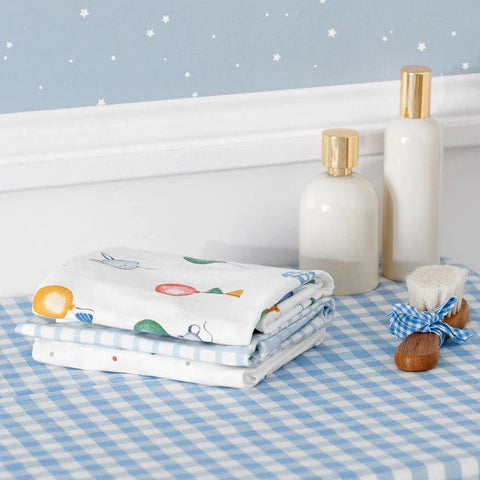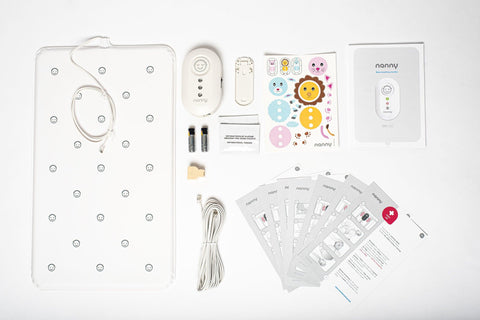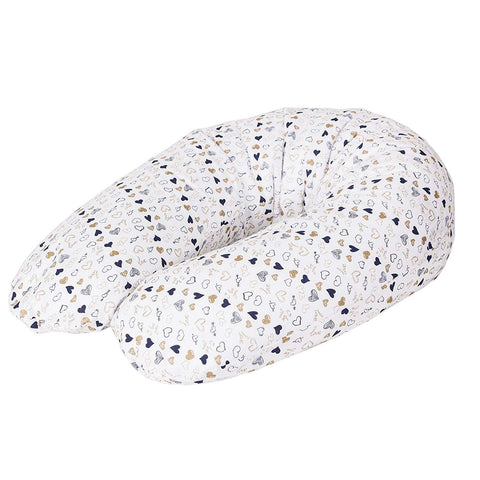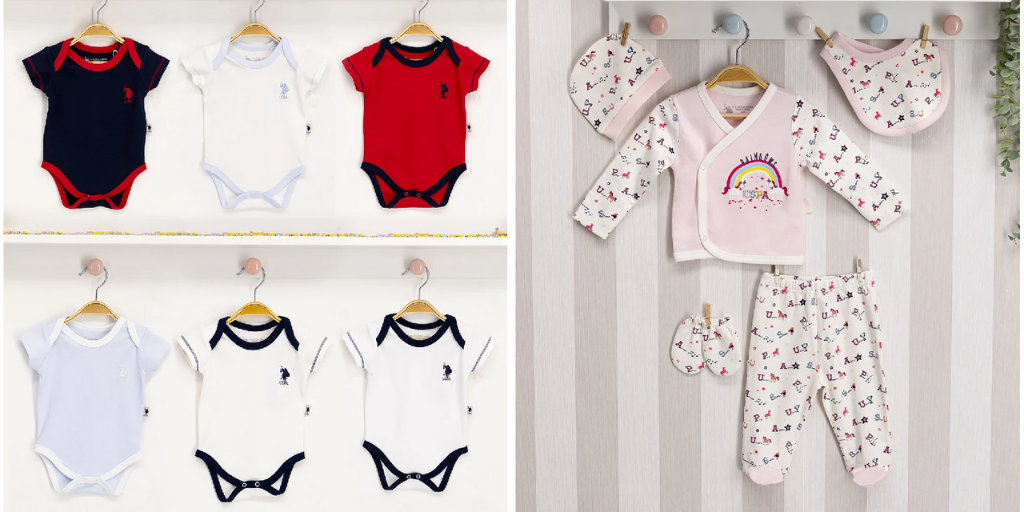
Dear mom, we know how overwhelming the first months of your baby's life can be. It is normal to think if you are giving him the best care. From the start, this means that you are already the best mother for your child. But, don't let anxiety overwhelm you.
Look for information only from reliable sources, and if you want correct answers to your questions, contact doctors and specialists in the field. We want to help you and give you some information for the beginning, which will help you take care of your baby as best as possible. There are tips recommended by specialists, so that your baby will be cared for as well as possible.
We also encourage you to go to the doctor whenever you see something abnormal. Never ask on forms or social media groups, as medical advice should only come from doctors.

Baby breathing monitoring system
Care of the umbilical cord until it falls off
Probably one of the first things you will learn about baby care is related to the umbilical cord. Until it falls off and the navel forms, you must take care of it as best as possible.
Carefully wipe the base of the cord with sanitary alcohol or another solution recommended by doctors, every time you change the diaper. Until it falls, avoid clothes that can catch on the cord and keep the area as dry as possible.
Do not apply various cosmetic products directly to the umbilical cord, such as alcohol or creams, because they can slow down the natural process of drying and falling of the cord.
If you notice signs of infection, such as excessive redness, bleeding or unusual secretions, it is important to contact the pediatrician for an immediate consultation and the recommendation of an appropriate treatment.
In general, the umbilical cord falls off on its own about 7-10 days after birth.
Breastfeeding the baby
In the first months of life, exclusive breastfeeding is recommended, if this is possible. Breastfeeding offers many benefits both for the baby and for you. Unfortunately, not all mothers find it easy to breastfeed, especially in the first weeks, until the body gets used to it.

However, you can implement some tips for a smooth breastfeeding. Ask for the help of maternity nurses or a lactation consultant, if there is one. Use a nursing pillow, so important especially if you gave birth by caesarean section. Then, learn how to properly attach the baby to the breast. Usually, if it hurts, it means that the position and the breastfeeding technique need to be adjusted.
You can also use various products to help you, such as special creams for healing wounds that may appear (stretch marks) and for their prevention, and even breast protectors, which prevent wounds.
To overcome difficulties related to breastfeeding, do not hesitate to ask for help. Lactation consultants or doctors specializing in lactation can offer advice and personalized assistance to improve your breastfeeding experience.
The baby's house
Another concern of new parents is related to the crib for the baby . You want everything to be perfect, to make sure that the temperature is right and that the baby will really relax.
Baby care is not only about the actual washing, but also about forming a routine and getting the baby used to a schedule. The water should not be hot, but at body temperature. The simplest is to use a special thermometer.
You can use a bathtub that has support for the first months or a chest of drawers that also has a bathtub. Also, if you need to wash the baby during the day, after changing the diaper, you can hold it over the sink (never put the baby in the sink) and wash only the bottom area.

If we talk about cosmetic products for the baby, choose a special shampoo for babies, which is delicate and does not irritate the eyes. For sensitive skin, a soap-free shower gel is a good choice, as it helps maintain the skin's natural balance. Make sure that the products you use are dermatologically tested and without perfume, essential oils, alcohol or artificial dyes, to minimize the risk of irritation.
Before putting the baby in the bathtub, wipe it gently with a wet cloth, so that it gets used to the water. Be careful to wash every fold of his skin, to avoid possible irritation.
After washing him, rinse him well and make sure that there is no soap left on his skin.
A bath of 5-10 minutes is enough for a very good wash and to relax the baby.
After you finish the bath, take it out of the tub and wrap it in a soft towel, gently patting the skin to dry it. Apply a delicate moisturizing cream for babies to keep their skin soft and hydrated.
Massage for babies
After the bath, a light massage for babies works best. This is not only good for relaxation, but also for the harmonious development and improvement of their general health. Through massage, you can improve blood circulation, relax muscles and stimulate the nervous system, which can help you sleep very well, but also reduce the discomfort caused by colic or gas.

Use a moisturizing cream specially formulated for the baby's skin when massaging it. Baby creams should be non-allergenic, without artificial fragrances or dyes. Begin the massage with soft and delicate movements, moving from the head to the toes. You can use light circular movements on the belly to help eliminate gas and abdominal discomfort.
Baby massage can be a special moment of bonding and connection between you and your little one, giving them the opportunity to feel loved and cared for.
Swaddling the baby

After the bath and massage, sleep follows for the baby. In the first months of life, babies feel best if they are swaddled. Swaddling creates a feeling of peace and security, because the baby feels like it's in the tummy. It is also useful for babies who reach the stage where they are scared of their hands. Choose special materials for swaddling and make sure you don't put too much pressure.
Baby's manicure and pedicure
Is it so that you dread it every time you think you have to cut your baby's nails? Many new parents prefer to let grandparents or other people do the baby's manicure and pedicure. However, it would be better to get over the fear, because nothing happens.
Choose the best time, when the baby is relaxed, such as after the bath. You can also try while sleeping. Use special scissors for babies, which have rounded tips. Thus, accidents are avoided. Cut the nails straight and not excessively short, to avoid cutting the skin around the nails.
If you cut your nails at night, you can apply a moisturizing cream, special for babies.
Baby's hair and scalp care
Let's also talk about Baby's scalp and hair care. For this, use a delicate shampoo, wash your hair very carefully without applying pressure on the hairpin.
If you notice that your baby develops scales on the scalp, it is possible that it is baby dermatitis, also known as "milk scales". Avoid using your fingernail to remove the scales, as you can irritate the delicate scalp. It is best to ask a pediatric dermatologist what you can use.
To comb the baby's hair, choose a hair brush with soft and round bristles, specially designed for babies. You can comb the hair delicately, without applying too much pressure or pulling on the sensitive hair.

Continue to monitor your baby's scalp and hair carefully and, if you notice any changes or persistent irritation, it is recommended to consult your pediatrician or a dermatologist for further evaluation and advice. With gentle and attentive care, your little one's scalp and hair will always be healthy.
Caring for the baby's eyes, ears and nose
How do you take care of your baby's eyes, ears and nose? With great care and listening to advice from specialists. To clean the baby's eyes, you can use physiological serum or special eye drops for newborns. Soak a gauze pad in the serum and gently wipe the area around the eyes, carefully removing any secretions or crusts.
For nose care, you can also use saline to help remove mucus and unclog the baby's airways. Apply a few drops in each nostril and then use a nasal aspirator if necessary to remove excess mucus.
Regarding the care of the ears, use a soft and wet cloth to carefully clean the area around the ears, avoiding inserting cotton wool or other objects inside the auditory canal. It is not necessary to clean the baby's ears deeply, because they clean themselves naturally.
Diaper changing
Another sensitive topic is diaper changing. To change the diaper, start by preparing all the necessary materials: clean diapers, wet wipes, bum cream and possibly diaper powder.

Changing the diaper can be done on a changing table, on the bed or on the sofa, where it is more comfortable for you. Remove the diaper and depending on the needs, use wet wipes based on water or even wash the baby at the sink.

After cleaning and drying the skin well, apply a small amount of diaper cream. Special creams for babies help to protect the delicate skin against irritation and rashes. Apply the cream in a thin layer, making sure to cover the entire area that comes in contact with the diaper.
It is important to change the diaper whenever you see that it is wet or dirty. Sensitive skin can be prone to irritation if it stays too long in a wet or dirty diaper.
If you notice signs of persistent irritation or other skin problems, do not hesitate to consult your pediatrician for advice and appropriate treatment.
The right temperature for the baby
Another concern of parents is related to the appropriate ambient temperature for the baby. When is it good to take the baby out? At what temperature should he sleep? How many degrees should it be in the house during the day? It is very important to maintain a comfortable and constant temperature in the house for your baby, both during the day and at night.
The ideal temperature inside the house should be between 20 and 22 degrees Celsius. Make sure your baby is dressed appropriately for the temperature in the house and uses a sleeping bag or suitable underwear to keep him comfortable while sleeping.
It is good to know that babies can be taken outside from birth, if the temperature is suitable and if there are no bad weather conditions. During the cold season, make sure the baby is well dressed in layers and covered, avoiding prolonged exposure to the cold. During the summer, try to avoid direct exposure to the sun and make sure that the baby is well hydrated and cooled during outdoor activities.

Not only the temperature of the room is important, but also the quality of the air. Airing the house is very important for ensuring an optimal air quality, not only for the baby, but also for all people.
It is recommended to air the house at least twice a day, opening the windows for a few minutes, regardless of the weather conditions. Airing must also be done before sleep, for relaxation. For air quality, you can also opt for a 2 in 1 purifier and humidifier.
Baby clothes

Last but not least, we also talk about clothes for babies. It is important to choose clothes made of natural materials, such as organic cotton or merino wool, which are soft and delicate for the baby's sensitive skin and allow the skin to breathe.
In the baby's wardrobe there should be pyjamas, bodysuits with long and short sleeves, overalls, hats and socks. Also, choose outdoor clothes for different seasons.

Avoid clothes with labels or seams that could cause discomfort to your little one.
In addition, it is important to choose clothes suitable for the weather conditions. During the summer, opt for light, breathable clothes with sun protection, and during the winter, make sure you have warm clothes to protect him from the cold and humidity.
Browse here a lot of wonderful clothes for your baby in his first months - HERE
So, dear mother, take these tips into account and don't forget: if you need specific information, ask your pediatrician or specialists in the field!



